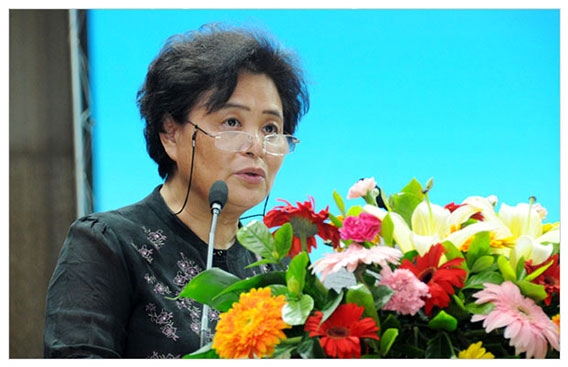CMB Profile: Li Youping

Professor Li Youping of Sichuan University is an expert in organ transplant immunology and engineering and an active leader in the field of Evidence Based Medicine (EBM) both in China and internationally. Beginning in 1996, Li initiated development of EBM in China with the establishment of the Chinese EBM Center/Chinese Cochrane Centre which gained CMB support. She now leads the EBM Ministry of Education Cooperative Research Center and directs the WHO International Clinical Trials Registry Platform (ICTRP) China Center. She founded the annual Asian EMB Conference, which is now in its 7th year. Li has not only written the seminal books on EBM in China and created the world’s premier Chinese language EBM journal (CJEBM) and Asia’s top English-language EBM journal (JEBM), she also mentors doctoral students at Sichuan University. She spoke with CMB staff about her passion for EBM and her aspirations for what EBM can do for China and the world:
Q: How did you first connect to CMB and how has CMB supported your work?
A: In 1997, then Minister of Health Chen Minzhang approved the establishment of the Chinese Cochrane Center/ChiCC, but we needed financial support from international organizations to make the project a reality. In 1998, CMB provided a grant of $570,000 to set up a China Evidence Based Medicine (EBM) Network, which supported international training of the Center’s scholars, domestic training programs, the establishment of a sub-center, founding of the Chinese Journal of Evidence Based Medicine (CJEBM), organizing of Asian Pacific EBM seminars, and the development of national EBM courses. CMB continued supporting our work in EBM with two grants in 2009 and 2012. We’ve used this funding to develop an Evidence Based Health Research Center and Database for Western China and create platforms for sharing EBM decision-making methodologies and data. To date, CMB remains the largest funder of the Chinese Cochrane Center/ChiCC.
Q: Why do you think Evidence Based Medicine (EBM) is so important to China?
A: China is a developing nation with the largest population in the world aiming for an ambitious goal: “Health for All by 2020.” To achieve this goal China needs to harness developments in science and technology to quickly process and analyze vast amounts of information. This means being able to identity and evaluate the best evidence in health. With this evidence, government, institutions, patients, and the general public can make better decisions for the appropriate and efficient allocation of limited health resources and work together achieve the goals of China’s health reforms.
For the past 10 years, I've worked to continuously promote and develop the field of EBM in China and utilize EMB to support China's health and medical education reforms. I've also been promoting the application of EBM beyond the world of clinical medicine into the realms of policy decision-making and management, basic research, and assessment of biological technologies.
Q: What interests you most about EBM?
A: Evidence is the core of EMB, and quality is the core of evidence. Scientific methodologies are necessary for producing and disseminating high quality evidence, and innovative use of these methodologies can be the foundation and soul of development. Since 2000, I’ve been fascinated by how EBM methodologies might be applied to problems in many other fields, and I’ve worked to explore, innovate, and extend traditional EBM methodologies.
Q: What is the greatest challenge for you working in EBM in China, and how will this challenge impact the direction of your future work?
A: In my own work, the largest problem I face is the challenge of integration. I want to effectively integrate the strengths of the EBM-related disciplines, platforms, human resources, and domestic and international popularization of the three CMB-funded EBM projects. We’re thinking of ways to integrate and share resources. For instance, we’re now working on an evidence-based decision-making methodologies and data-sharing platform for postdoctoral researchers. However, the greatest challenge for the overall development of EBM in China is the government—development of EBM is dependent on the government’s recognition, financial support, and policy responses. We should adhere to the planning principles set forth by the Ministry of Health in 1997, when the Chinese Cochrane Center was established, to share international resources and information, continuously strive to improve clinical diagnosis and treatment, and serve the advancement of medicine, research, teaching, and health decision-making. We should also follow the mission of the WHO’s International Clinical Trials Registry Platform, ICTRP, which is to ensure that a complete view of research is accessible to all those involved in health care decision making. We’re working to achieve this mission with our Chinese clinical trial registration and publishing guidelines system. Overall, we’re working cooperatively to serve the country’s health system and medical education reforms, which we see connected beyond China’s goals to the global priorities of this century.
